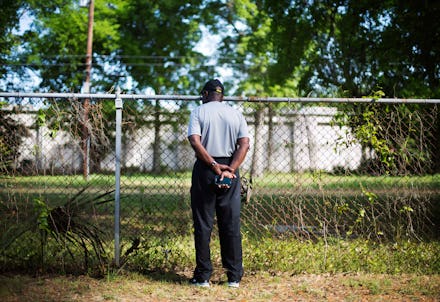What Would've Happened if the Walter Scott Killing Weren't Caught on Video

Imagine there was no camera.
Imagine no one had filmed Walter L. Scott being shot in the back Saturday by a North Charleston, South Carolina, police officer. Imagine the only thing we knew about this 50-year-old black man's death was what his murderer told us — that Scott had stolen the officer's stun gun and therefore posed an immediate threat.
Now imagine how often this sort of thing happens when cameras aren't rolling. That's the level of state-sanctioned violence black people face in America today.
Here's what we know: North Charleston Officer Michael Slager pulled Scott over Saturday for an alleged broken taillight. Slager claims a scuffle ensued — though proof of this has yet to materialize — and the next thing we know, Scott is running.
He's a few feet away when Slager fires the first shot. Seven more bullets fly, and the victim is writhing until he is forced to the ground. Eight shots total, all aimed at his back. And all captured on video by a yet-unnamed bystander whose chilling words articulate all there really is to say in a moment like that:
"Oh shit. Oh shit."
The next part is just as horrific. Slager walks calmly toward Scott's motionless body and calls his fellow officers on the police radio. He yells at Scott to put his hands behind his back. Slager handcuffs Scott's limp arms. Then a group of officers converge on the scene and start about the messy business of removing the 50-year-old's corpse.
This is what we know. This is what we saw with our own eyes.
But then there's what we were told. The narrative the North Charleston police fed news outlets and inquirers — and that most Americans might have believed had no video evidence materialized — was that Slager killed Scott in self-defense. WCIV-TV in Charleston reported the following Saturday:
"Police and witnesses say Scott tried to run from Slager before turning to fight for the officer's Taser. It was during that scuffle that the officer fired his service weapon, fatally wounding Scott."
The Post and Courier reported that police were "alleging the dead man fought with an officer over his Taser before deadly force was employed."
Meanwhile, Slager's attorney told WCIV-TV that his client believed he had "followed proper procedure" in killing Scott.
So three things are clear after reading these claims. The first is that Slager lied about what he did. Until documentary evidence to the contrary was sent to investigators and published by the New York Times, the local media and North Charleston police might have been complicit in sweeping a murder under the rug.
The second is that we should be afraid — not just of the police, but of how easily we seem to have internalized this racist narrative that unarmed black men charge fearlessly at gun-toting police officers with the intent to disarm them.
Perhaps even scarier is why Slager felt so confident in this narrative in the first place: Just four months prior, ex-Ferguson, Missouri, police Officer Darren Wilson had evaded a murder indictment because he convinced a grand jury that an unarmed black teenager named Michael Brown — a "demon" in Wilson's words — was a threat to his life. The lesson is clear: Few people go to jail for failing to convince Americans of the dangers posed by black men.
Which brings up a third lesson: We will not stop police violence by capturing every incident on video. Officer Daniel Pantaleo of the New York Police Department proved this in December 2014 when he walked free after strangling Eric Garner to death on Staten Island. But that doesn't mean doing so is unimportant. After all, Slager is now facing murder charges — a far cry from justice, but closer than we've gotten in a long time.
And no matter how hard these incidents are to watch, documenting them weakens the police's ability to gaslight us, to convince us we don't live under a violently racist social hierarchy when we clearly do. In the end, it brings us closer to the truth of the violence this country has been committing against black people for generations. Maybe someday people won't be able to deny that anymore.
Imagine that.